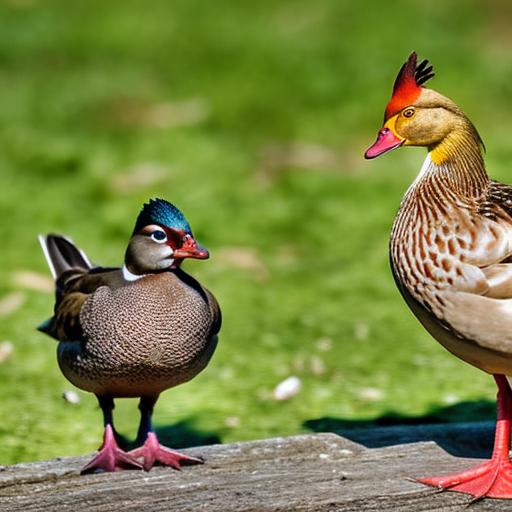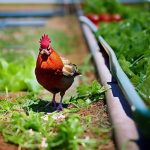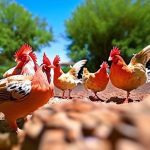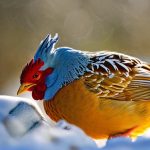Cayuga ducks and chickens are popular choices for backyard poultry enthusiasts. Both species are known for their beauty, usefulness, and friendly personalities. Cayuga ducks are a domesticated breed that originated in the United States, specifically in the Cayuga Lake region of New York. They are medium-sized ducks with striking black feathers that have a greenish sheen in the sunlight. Chickens, on the other hand, come in a wide variety of breeds, each with its own unique characteristics.
Many people choose to keep Cayuga ducks and chickens together because they can coexist harmoniously and provide several benefits to each other. Ducks and chickens have similar housing and feeding requirements, making it easier for owners to care for both species simultaneously. Additionally, they can provide companionship to each other and help control pests in the yard.
Key Takeaways
- Cayuga ducks and chickens are both popular backyard poultry breeds.
- Cayuga ducks and chickens have some similarities in terms of diet and housing requirements, but also have some key differences in behavior and physical characteristics.
- Keeping Cayuga ducks and chickens together can provide benefits such as pest control and social interaction, but can also present challenges such as potential health concerns and behavioral issues.
- Housing requirements for Cayuga ducks and chickens should include separate areas for nesting and roosting, as well as access to water for the ducks.
- Feeding requirements for Cayuga ducks and chickens should include a balanced diet of grains, vegetables, and protein sources.
- Health concerns for Cayuga ducks and chickens living together include the potential for disease transmission and the need for regular parasite control.
- Tips for introducing Cayuga ducks to a chicken flock include gradually introducing them and providing plenty of space and resources.
- Potential behavioral issues between Cayuga ducks and chickens include aggression and competition for resources.
- Ultimately, whether or not you can keep Cayuga ducks with chickens depends on your individual situation and willingness to manage potential challenges.
Similarities and Differences between Cayuga Ducks and Chickens
When comparing Cayuga ducks and chickens, there are both similarities and differences in their physical characteristics, temperament, behavior, and egg-laying habits.
In terms of physical characteristics, both Cayuga ducks and chickens have feathers, beaks, and legs. However, there are distinct differences in their appearances. Cayuga ducks have a sleek body shape with a long neck and a small head. They have black feathers that can appear greenish in certain lighting conditions. Chickens, on the other hand, come in various sizes, shapes, and colors depending on the breed.
In terms of temperament and behavior, Cayuga ducks are known for being friendly and sociable. They enjoy interacting with humans and other animals. Chickens can also be friendly but may be more skittish or flighty compared to ducks. Both species are generally docile but can become aggressive if they feel threatened or if there is competition for resources.
When it comes to egg-laying habits, Cayuga ducks are known for their excellent egg production. They can lay up to 200 eggs per year, with each egg being a dark gray or black color. Chickens, on the other hand, have a wider range of egg colors depending on the breed. They can lay white, brown, blue, green, or even speckled eggs. Chickens typically lay fewer eggs per year compared to Cayuga ducks.
Benefits of Keeping Cayuga Ducks and Chickens Together
There are several benefits to keeping Cayuga ducks and chickens together in the same backyard or coop.
One of the main benefits is pest control. Both ducks and chickens are natural foragers and will eat insects, slugs, snails, and other pests in the yard. By keeping them together, you can have a natural pest control system that helps keep your garden or yard free from unwanted critters.
Another benefit is companionship. Ducks and chickens can form bonds with each other and provide social interaction. They can also help keep each other company when their human owners are not around. This companionship can be especially beneficial for ducks, as they are highly social animals that thrive in the presence of others.
Lastly, keeping both ducks and chickens together can provide a variety of eggs. With Cayuga ducks laying dark-colored eggs and chickens laying eggs of various colors, you can have a visually appealing assortment of eggs for your breakfast table or for sharing with friends and family.
Challenges of Keeping Cayuga Ducks and Chickens Together
While there are many benefits to keeping Cayuga ducks and chickens together, there are also some challenges that owners should be aware of.
One challenge is the different dietary needs of ducks and chickens. Ducks require more water in their diet compared to chickens, as they need water to help them swallow their food. This means that ducks may need access to a water source at all times, which can be challenging if you have a traditional chicken coop setup. Additionally, ducks require a higher protein diet compared to chickens, so their feed may need to be supplemented with additional protein sources.
Another challenge is the potential for aggression between ducks and chickens. While they can coexist peacefully, there may be instances where territorial disputes or competition for resources can lead to aggression. It is important to monitor their behavior and intervene if necessary to prevent any injuries.
Hygiene concerns are also a challenge when keeping ducks and chickens together. Ducks produce more waste compared to chickens, and their droppings are wetter, which can lead to a messier coop or run. Regular cleaning and maintenance are necessary to ensure a clean and healthy living environment for both species.
Housing Requirements for Cayuga Ducks and Chickens
When keeping Cayuga ducks and chickens together, it is important to provide them with appropriate housing that meets their specific needs.
The coop and run size should be spacious enough to accommodate both species comfortably. Ducks require more space compared to chickens due to their larger size and need for water. The coop should have adequate ventilation and insulation to keep the birds comfortable in different weather conditions.
Nesting boxes and roosts should be provided for both ducks and chickens. Ducks prefer nesting on the ground or in low, sheltered areas, while chickens prefer elevated nesting boxes. Providing separate nesting areas for each species can help prevent competition or aggression over nesting spots.
Water sources are crucial for ducks, as they need water for drinking, bathing, and preening. A shallow pool or pond should be provided for ducks to meet their water requirements. However, it is important to ensure that the water source is safe and secure to prevent drowning accidents.
Feeding Requirements for Cayuga Ducks and Chickens

Cayuga ducks and chickens have different feeding requirements that should be taken into consideration when keeping them together.
Ducks require a higher protein diet compared to chickens. Their feed should contain around 16-18% protein to support their growth, egg production, and overall health. Additionally, ducks need access to water while eating to help them swallow their food. This can be achieved by providing a shallow dish of water next to their feed.
Chickens, on the other hand, require a lower protein diet compared to ducks. Their feed should contain around 14-16% protein. Chickens also need access to grit, which helps them grind their food in their gizzards. Grit can be provided in a separate dish or scattered on the ground.
Both ducks and chickens can benefit from supplemental treats such as fruits, vegetables, and mealworms. However, it is important to avoid feeding them toxic foods such as chocolate, onions, or avocado.
Water requirements are also different for ducks and chickens. Ducks need access to water at all times for drinking, bathing, and preening. Chickens, on the other hand, can drink from traditional waterers or nipple drinkers.
Health Concerns for Cayuga Ducks and Chickens Living Together
When keeping Cayuga ducks and chickens together, there are several health concerns that owners should be aware of.
One concern is the transmission of diseases between the two species. While ducks and chickens can coexist peacefully, they can still transmit diseases to each other if one of them is infected. It is important to practice good biosecurity measures such as regular cleaning and disinfection of the coop and run, as well as monitoring the health of both species.
Parasites are another concern when keeping ducks and chickens together. Both species can be affected by external parasites such as mites or lice. Regular inspections and treatments should be done to prevent infestations and keep the birds healthy.
Injury risks are also a concern when ducks and chickens live together. Ducks have webbed feet and may accidentally step on or injure chickens while moving around. It is important to provide enough space and separate areas for each species to minimize the risk of injuries.
Tips for Introducing Cayuga Ducks to a Chicken Flock
When introducing Cayuga ducks to an existing chicken flock, it is important to take certain steps to ensure a smooth transition.
Gradual introduction is key to minimizing stress and aggression. Ducks and chickens should be kept separate initially, with visual barriers such as fences or wire mesh between them. This allows them to get used to each other’s presence without direct contact.
Providing separate spaces for ducks and chickens can also help prevent aggression. Each species should have their own feeding and watering areas, as well as separate nesting spots. This prevents competition and reduces the risk of aggression.
Monitoring behavior is crucial during the introduction process. Any signs of aggression or stress should be addressed immediately. If necessary, the birds may need to be separated temporarily until they can coexist peacefully.
Potential Behavioral Issues between Cayuga Ducks and Chickens
When keeping Cayuga ducks and chickens together, there are potential behavioral issues that may arise.
Aggression towards each other can occur if there is competition for resources such as food, water, or nesting spots. It is important to provide enough resources for both species to minimize aggression. Additionally, monitoring their behavior and intervening if necessary can help prevent any injuries.
Dominance struggles may also occur between ducks and chickens. Ducks are generally more dominant compared to chickens and may try to assert their dominance over the flock. This can lead to conflicts and aggression. Providing enough space and resources can help minimize dominance struggles.
Mating behaviors can also be a potential issue when keeping ducks and chickens together. Male ducks may attempt to mate with female chickens, which can cause stress or injury to the chickens. Separating the male ducks from the flock or providing separate areas for each species during mating season can help prevent any issues.
Can You Keep Cayuga Ducks with Chickens?
In conclusion, keeping Cayuga ducks with chickens can be a rewarding and beneficial experience. Both species can coexist harmoniously and provide several benefits to each other. However, there are also challenges and considerations that owners should be aware of.
By providing appropriate housing, feeding, and monitoring their behavior, owners can successfully keep Cayuga ducks and chickens together. The benefits of pest control, companionship, and a variety of eggs make it an attractive option for backyard poultry enthusiasts.
If you are considering keeping Cayuga ducks with chickens, it is important to do thorough research and ensure that you have the necessary resources and knowledge to care for both species properly. With proper planning and management, you can create a thriving and harmonious environment for your feathered friends.
If you’re considering keeping Cayuga ducks with chickens, it’s important to understand the dynamics between these two species. While they can coexist peacefully, there are certain factors to consider. For more information on this topic, check out this informative article on Poultry Wizard: Can You Keep Cayuga Ducks with Chickens? This article provides valuable insights and tips on successfully integrating these feathered friends in your backyard flock.
FAQs
What are Cayuga ducks?
Cayuga ducks are a breed of domesticated ducks that are known for their black feathers with a greenish sheen. They are medium-sized ducks and are commonly kept as pets or for their meat and eggs.
Can Cayuga ducks be kept with chickens?
Yes, Cayuga ducks can be kept with chickens. They are generally peaceful birds and can coexist with other poultry species. However, it is important to ensure that the coop and run are large enough to accommodate both species and that there is enough food and water for everyone.
Do Cayuga ducks and chickens have different dietary needs?
Cayuga ducks and chickens have similar dietary needs and can eat the same types of feed. However, ducks require more niacin in their diet than chickens, so it is important to provide them with a source of niacin, such as brewer’s yeast or niacin supplements.
Do Cayuga ducks and chickens need different types of housing?
Cayuga ducks and chickens can be housed together in the same coop and run, as long as there is enough space for everyone. However, ducks require access to water for swimming and cleaning their feathers, so it is important to provide them with a shallow pool or water source.
Are there any health concerns when keeping Cayuga ducks with chickens?
There are no major health concerns when keeping Cayuga ducks with chickens, as long as they are kept in clean and sanitary conditions. However, ducks can carry different types of diseases than chickens, so it is important to practice good biosecurity measures and monitor the health of all birds regularly.
Meet Walter, the feathered-friend fanatic of Florida! Nestled in the sunshine state, Walter struts through life with his feathered companions, clucking his way to happiness. With a coop that’s fancier than a five-star hotel, he’s the Don Juan of the chicken world. When he’s not teaching his hens to do the cha-cha, you’ll find him in a heated debate with his prized rooster, Sir Clucks-a-Lot. Walter’s poultry passion is no yolk; he’s the sunny-side-up guy you never knew you needed in your flock of friends!







